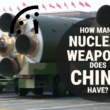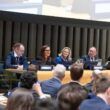The zone: Avenue toward a comprehensive settlement
By Ayman Khalil, August 14, 2013
Isaac Newton observed, in so many words, that for every action there is an equal and opposite reaction. What does this have to do with the proposed Middle Eastern zone free of weapons of mass destruction? Well, when efforts to resolve a complex problem like WMD result in deadlock, it is essential to search for innovative, nontraditional approaches to the issue. And perhaps it's the case that the laws of physics, which regulate people's interactions with their physical environment, can be applied usefully to people's interactions with one another.
In Round Two Ehud Eiran identified, and aligned himself with, a certain outlook on the WMD-free zone. According to this outlook, "weapons of mass destruction are an extension of the region's broader political cleavages—cleavages that have an inescapable violent dimension." Unfortunately, this way of looking at things makes the mistake of justifying the existence of WMD. But it also ignores Newton: The "violent dimension" to which Eiran refers is often merely a reaction to an original action, namely the set of grave injustices practiced upon Palestinians amid Israel's ongoing occupation of Palestinian territories. Indeed, the region's deteriorating security situation can in large measure be attributed to these injustices. As long as this Israeli "action" persists, reactions of various kinds and magnitudes can be expected to persist as well, even beyond the occupation's immediate geographical context. Israel's occupation of Palestinian territory is among the few remaining occupations in the world, and many view it as the primary source of tensions in the region.
Meanwhile, many Israelis consider nuclear weapons an effective insurance policy for their nation's security—but this insurance policy could bring about the annihilation of an entire region, including Israel itself. Those who believe that nuclear weapons deserve the credit for Israel's survival to this point are simply mistaken. Israel's nuclear arsenal has failed to prevent several military confrontations between Israel and its Arab neighbors: Egypt and its allies launched an attack in 1973; Saddam Hussein fired Scud missiles at Israeli targets during the Gulf War; and Hezbollah has fired Katyusha rockets into Israel, notably in 2006. In short, Israel's nuclear arsenal has failed as a deterrent.
In the long run, Israel cannot ensure its security through military might (though one can argue that Israel, with an advanced arsenal of conventional weapons, could maintain its military superiority for a long time even if it foreswore nuclear weapons). In any event, history offers few examples of nations' using nonconventional military capabilities to deter ill-equipped rivals armed only with conventional weapons. For Israel, a better approach would be to establish a good-neighbor policy that might reduce hostility and enhance regional ties.
A new era? As this discussion comes to a close, I would like to emphasize that weapons of mass destruction and the Middle East's broader security issues cannot be treated independently. This should be apparent from the failure in the 1990s of the discussion forum known as Arms Control and Regional Security in the Middle East. That initiative was intended to work toward peace and conflict resolution, but it collapsed over Israel's complete refusal to discuss issues related to its nonconventional weapons.
Martin Malin argued in Round Two that establishing a WMD-free zone is not the most pressing security concern in the Middle East right now. Even if that is true, the effort to establish such a zone would provide a promising forum for resolving acute conflicts in a troubled region. Ultimately, the elimination of WMD from the Middle East would mean that countries in the region had achieved stable relations; ended hostilities; reached agreement on common security arrangements; and initiated an era of fruitful exchanges. That is why the initiative to establish a WMD-free zone must not be allowed to die.
Topics: Nuclear Weapons, Technology and Security
Share: [addthis tool="addthis_inline_share_toolbox"]














